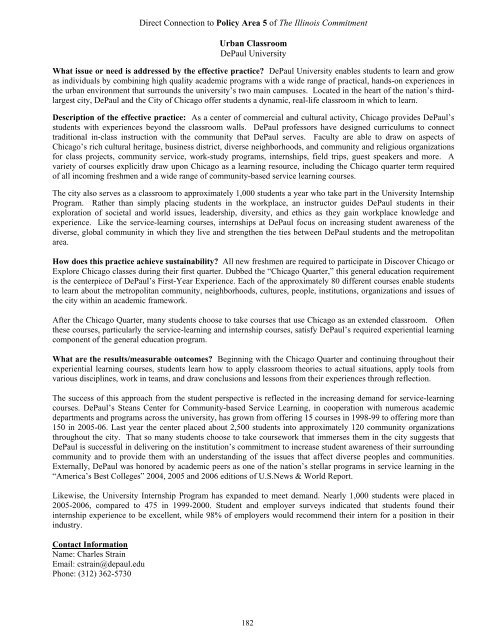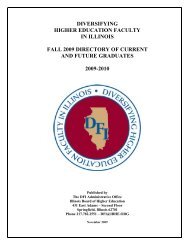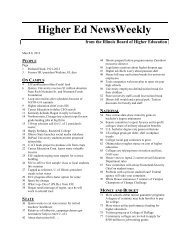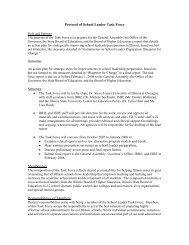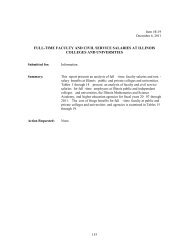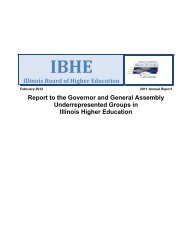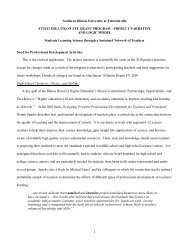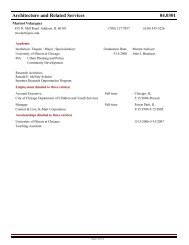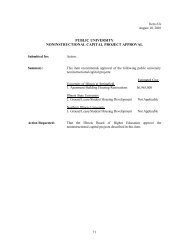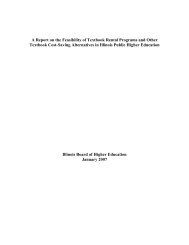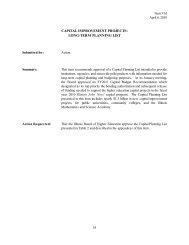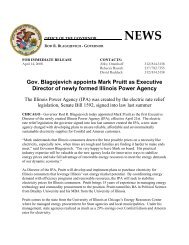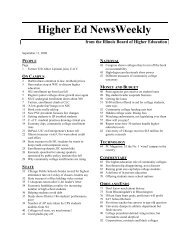Title of Effective Practice: - California Postsecondary Education ...
Title of Effective Practice: - California Postsecondary Education ...
Title of Effective Practice: - California Postsecondary Education ...
Create successful ePaper yourself
Turn your PDF publications into a flip-book with our unique Google optimized e-Paper software.
Direct Connection to Policy Area 5 <strong>of</strong> The Illinois Commitment<br />
Urban Classroom<br />
DePaul University<br />
What issue or need is addressed by the effective practice? DePaul University enables students to learn and grow<br />
as individuals by combining high quality academic programs with a wide range <strong>of</strong> practical, hands-on experiences in<br />
the urban environment that surrounds the university’s two main campuses. Located in the heart <strong>of</strong> the nation’s thirdlargest<br />
city, DePaul and the City <strong>of</strong> Chicago <strong>of</strong>fer students a dynamic, real-life classroom in which to learn.<br />
Description <strong>of</strong> the effective practice: As a center <strong>of</strong> commercial and cultural activity, Chicago provides DePaul’s<br />
students with experiences beyond the classroom walls. DePaul pr<strong>of</strong>essors have designed curriculums to connect<br />
traditional in-class instruction with the community that DePaul serves. Faculty are able to draw on aspects <strong>of</strong><br />
Chicago’s rich cultural heritage, business district, diverse neighborhoods, and community and religious organizations<br />
for class projects, community service, work-study programs, internships, field trips, guest speakers and more. A<br />
variety <strong>of</strong> courses explicitly draw upon Chicago as a learning resource, including the Chicago quarter term required<br />
<strong>of</strong> all incoming freshmen and a wide range <strong>of</strong> community-based service learning courses.<br />
The city also serves as a classroom to approximately 1,000 students a year who take part in the University Internship<br />
Program. Rather than simply placing students in the workplace, an instructor guides DePaul students in their<br />
exploration <strong>of</strong> societal and world issues, leadership, diversity, and ethics as they gain workplace knowledge and<br />
experience. Like the service-learning courses, internships at DePaul focus on increasing student awareness <strong>of</strong> the<br />
diverse, global community in which they live and strengthen the ties between DePaul students and the metropolitan<br />
area.<br />
How does this practice achieve sustainability? All new freshmen are required to participate in Discover Chicago or<br />
Explore Chicago classes during their first quarter. Dubbed the “Chicago Quarter,” this general education requirement<br />
is the centerpiece <strong>of</strong> DePaul’s First-Year Experience. Each <strong>of</strong> the approximately 80 different courses enable students<br />
to learn about the metropolitan community, neighborhoods, cultures, people, institutions, organizations and issues <strong>of</strong><br />
the city within an academic framework.<br />
After the Chicago Quarter, many students choose to take courses that use Chicago as an extended classroom. Often<br />
these courses, particularly the service-learning and internship courses, satisfy DePaul’s required experiential learning<br />
component <strong>of</strong> the general education program.<br />
What are the results/measurable outcomes? Beginning with the Chicago Quarter and continuing throughout their<br />
experiential learning courses, students learn how to apply classroom theories to actual situations, apply tools from<br />
various disciplines, work in teams, and draw conclusions and lessons from their experiences through reflection.<br />
The success <strong>of</strong> this approach from the student perspective is reflected in the increasing demand for service-learning<br />
courses. DePaul’s Steans Center for Community-based Service Learning, in cooperation with numerous academic<br />
departments and programs across the university, has grown from <strong>of</strong>fering 15 courses in 1998-99 to <strong>of</strong>fering more than<br />
150 in 2005-06. Last year the center placed about 2,500 students into approximately 120 community organizations<br />
throughout the city. That so many students choose to take coursework that immerses them in the city suggests that<br />
DePaul is successful in delivering on the institution’s commitment to increase student awareness <strong>of</strong> their surrounding<br />
community and to provide them with an understanding <strong>of</strong> the issues that affect diverse peoples and communities.<br />
Externally, DePaul was honored by academic peers as one <strong>of</strong> the nation’s stellar programs in service learning in the<br />
“America’s Best Colleges” 2004, 2005 and 2006 editions <strong>of</strong> U.S.News & World Report.<br />
Likewise, the University Internship Program has expanded to meet demand. Nearly 1,000 students were placed in<br />
2005-2006, compared to 475 in 1999-2000. Student and employer surveys indicated that students found their<br />
internship experience to be excellent, while 98% <strong>of</strong> employers would recommend their intern for a position in their<br />
industry.<br />
Contact Information<br />
Name: Charles Strain<br />
Email: cstrain@depaul.edu<br />
Phone: (312) 362-5730<br />
182


